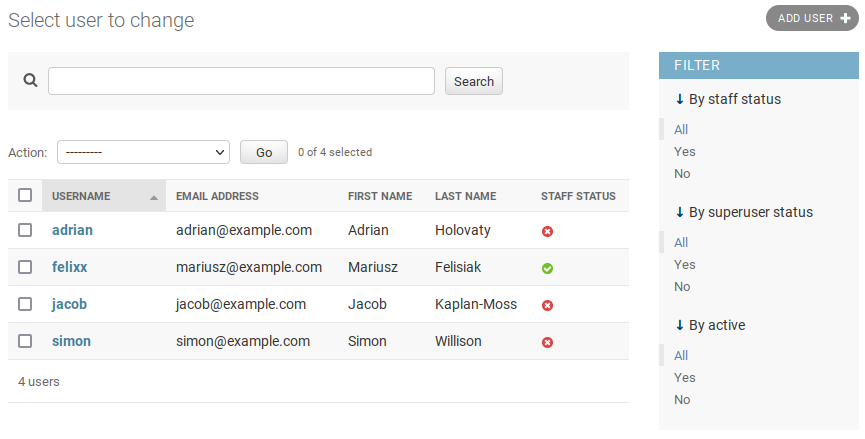ModelAdmin List Filters¶
ModelAdmin classes can define list filters that appear in the right sidebar
of the change list page of the admin, as illustrated in the following
screenshot:

To activate per-field filtering, set ModelAdmin.list_filter to a list
or tuple of elements, where each element is one of the following types:
- A field name.
- A subclass of
django.contrib.admin.SimpleListFilter. - A 2-tuple containing a field name and a subclass of
django.contrib.admin.FieldListFilter.
See the examples below for discussion of each of these options for defining
list_filter.
Using a field name¶
The simplest option is to specify the required field names from your model.
Each specified field should be either a BooleanField, CharField,
DateField, DateTimeField, IntegerField, ForeignKey or
ManyToManyField, for example:
class PersonAdmin(admin.ModelAdmin):
list_filter = ["is_staff", "company"]
list_filter 中的字段名也可以使用 __ 查找来跨越关系,例如:
class PersonAdmin(admin.UserAdmin):
list_filter = ["company__name"]
Using a SimpleListFilter¶
For custom filtering, you can define your own list filter by subclassing
django.contrib.admin.SimpleListFilter. You need to provide the title
and parameter_name attributes, and override the lookups and
queryset methods, e.g.:
from datetime import date
from django.contrib import admin
from django.utils.translation import gettext_lazy as _
class DecadeBornListFilter(admin.SimpleListFilter):
# Human-readable title which will be displayed in the
# right admin sidebar just above the filter options.
title = _("decade born")
# Parameter for the filter that will be used in the URL query.
parameter_name = "decade"
def lookups(self, request, model_admin):
"""
Returns a list of tuples. The first element in each
tuple is the coded value for the option that will
appear in the URL query. The second element is the
human-readable name for the option that will appear
in the right sidebar.
"""
return [
("80s", _("in the eighties")),
("90s", _("in the nineties")),
]
def queryset(self, request, queryset):
"""
Returns the filtered queryset based on the value
provided in the query string and retrievable via
`self.value()`.
"""
# Compare the requested value (either '80s' or '90s')
# to decide how to filter the queryset.
if self.value() == "80s":
return queryset.filter(
birthday__gte=date(1980, 1, 1),
birthday__lte=date(1989, 12, 31),
)
if self.value() == "90s":
return queryset.filter(
birthday__gte=date(1990, 1, 1),
birthday__lte=date(1999, 12, 31),
)
class PersonAdmin(admin.ModelAdmin):
list_filter = [DecadeBornListFilter]
备注
为方便起见,HttpRequest 对象被传递给 lookups 和 queryset 方法,例如:
class AuthDecadeBornListFilter(DecadeBornListFilter):
def lookups(self, request, model_admin):
if request.user.is_superuser:
return super().lookups(request, model_admin)
def queryset(self, request, queryset):
if request.user.is_superuser:
return super().queryset(request, queryset)
另外,为了方便起见,ModelAdmin 对象被传递给 lookups 方法,例如,如果你想根据现有数据进行查找:
class AdvancedDecadeBornListFilter(DecadeBornListFilter):
def lookups(self, request, model_admin):
"""
Only show the lookups if there actually is
anyone born in the corresponding decades.
"""
qs = model_admin.get_queryset(request)
if qs.filter(
birthday__gte=date(1980, 1, 1),
birthday__lte=date(1989, 12, 31),
).exists():
yield ("80s", _("in the eighties"))
if qs.filter(
birthday__gte=date(1990, 1, 1),
birthday__lte=date(1999, 12, 31),
).exists():
yield ("90s", _("in the nineties"))
Using a field name and an explicit FieldListFilter¶
Finally, if you wish to specify an explicit filter type to use with a field you
may provide a list_filter item as a 2-tuple, where the first element is a
field name and the second element is a class inheriting from
django.contrib.admin.FieldListFilter, for example:
class PersonAdmin(admin.ModelAdmin):
list_filter = [
("is_staff", admin.BooleanFieldListFilter),
]
Here the is_staff field will use the BooleanFieldListFilter. Specifying
only the field name, fields will automatically use the appropriate filter for
most cases, but this format allows you to control the filter used.
The following examples show available filter classes that you need to opt-in to use.
你可以使用 RelatedOnlyFieldListFilter 将相关模型的选择限制在该关系所涉及的对象上:
class BookAdmin(admin.ModelAdmin):
list_filter = [
("author", admin.RelatedOnlyFieldListFilter),
]
Assuming author is a ForeignKey to a User model, this will
limit the list_filter choices to the users who have written a book,
instead of listing all users.
你可以使用 EmptyFieldListFilter 来过滤空值,它既可以过滤空字符串也可以过滤空值,这取决于字段允许存储的内容:
class BookAdmin(admin.ModelAdmin):
list_filter = [
("title", admin.EmptyFieldListFilter),
]
By defining a filter using the __in lookup, it is possible to filter for
any of a group of values. You need to override the expected_parameters
method, and the specify the lookup_kwargs attribute with the appropriate
field name. By default, multiple values in the query string will be separated
with commas, but this can be customized via the list_separator attribute.
The following example shows such a filter using the vertical-pipe character as
the separator:
class FilterWithCustomSeparator(admin.FieldListFilter):
# custom list separator that should be used to separate values.
list_separator = "|"
def __init__(self, field, request, params, model, model_admin, field_path):
self.lookup_kwarg = "%s__in" % field_path
super().__init__(field, request, params, model, model_admin, field_path)
def expected_parameters(self):
return [self.lookup_kwarg]
备注
不支持 GenericForeignKey 字段。
List filters typically appear only if the filter has more than one choice. A
filter's has_output() method controls whether or not it appears.
可以指定一个自定义模板来呈现列表过滤器:
class FilterWithCustomTemplate(admin.SimpleListFilter):
template = "custom_template.html"
具体的例子请看 Django 提供的默认模板(admin/filter.html)。
Last update:
5月 12, 2023